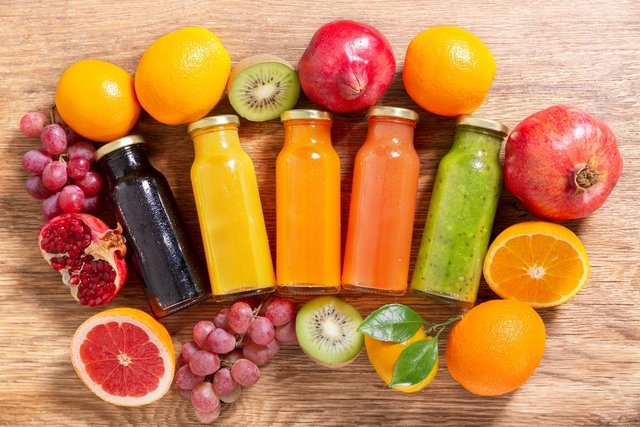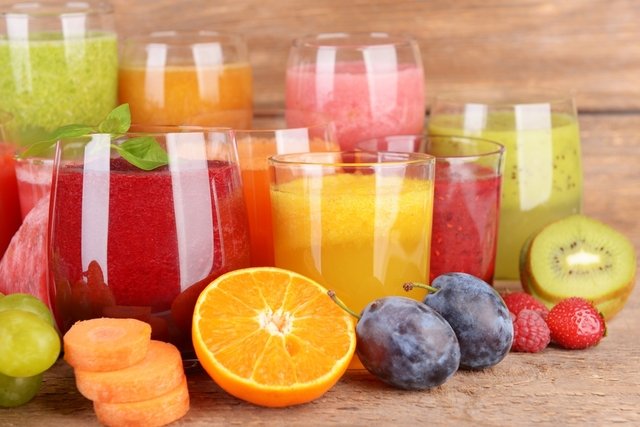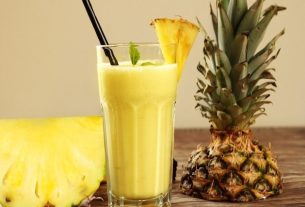Natural fruit juices, such as orange, grape and pomegranate, are rich in antioxidants and fiber, making them good options to help lower “bad” cholesterol levels, LDL, in the blood, reducing the risk of cardiovascular diseases, such as heart attack, atherosclerosis and stroke.
To help lower blood cholesterol levels, you can drink 1 glass of 200 ml of one of these juices per day, along with one of your meals, such as breakfast, lunch or dinner and it is important to prepare the drink only with fruit. fresh and with the peel.
Furthermore, to help lower “bad” cholesterol, it is also recommended to practice physical activity regularly and maintain a balanced diet, avoiding alcoholic beverages and foods rich in fat and sugar. See how to follow a diet to lower cholesterol.

Some juices that can help lower blood cholesterol are:
1. Grape juice
Grape juice contains resveratrol, which is a bioactive compound with antioxidant properties, preventing the oxidation of fat cells and reducing blood cholesterol levels.
The resveratrol present in grapes also has anti-inflammatory action, helping to combat excess free radicals and prevent the formation of fatty plaques in the arteries.
Preparation mode: Blend 1 cup of unpeeled purple grapes in a blender with 1/2 cup of water. Transfer to a glass and drink immediately, without straining or adding sugar.
2. Orange juice with eggplant
Orange juice with eggplant is a great option for lowering cholesterol, as this juice is rich in fiber, a nutrient that reduces the absorption of fat from food in the intestine, reducing “bad” cholesterol levels in the blood.
Furthermore, antioxidants, such as vitamin C, vitamin A and flavonoids present in oranges and eggplant, also fight excess free radicals, helping to lower cholesterol.
Preparation mode: Place 1/2 small eggplant with skin in a blender + 150 ml of natural orange juice, with the pomace, if possible. Blend for 2 minutes and then drink, without straining and without adding sugar.
3. Guava juice
Guava is a fruit rich in pectin, a type of fiber that helps reduce the absorption of fat in the intestine, controlling blood cholesterol levels.
Furthermore, red guava juice is rich in lycopene, a nutrient with antioxidant action that prevents the oxidation of fat cells, helping to control blood cholesterol levels.
Preparation mode: Blend 1 red guava with peel + juice of 1 lemon + 150ml of water in a blender. Preferably drink the juice without straining or adding sugar.
4. Watermelon juice
Watermelon juice contains lycopene, arginine and citrulline, powerful antioxidants that inhibit the oxidation of fat cells, reducing cholesterol levels and the risk of formation of fatty plaques in blood vessels.
Preparation mode: Place 2 small slices of watermelon in the blender and blend until smooth. Drink immediately, without straining or adding sugar.
5. Pomegranate juice
Pomegranate juice has bioactive compounds, such as flavonoids and ellagic acid, which have anti-inflammatory and antioxidant action, which inhibit the production of free radicals, helping to lower blood cholesterol levels and prevent diseases such as heart attack, stroke and atherosclerosis .
Preparation mode: Place the pulp of 1 pomegranate, with seeds, in a blender along with 1 glass of water. Blend for a few minutes, transfer to a glass and drink without straining or adding sugar.
6. Apple juice
Apples are rich in fiber that helps reduce the absorption of fat from food, eliminating them in the feces, helping to reduce excess “bad” cholesterol.
Furthermore, apple juice has good amounts of anthocyanins, compounds with antioxidant properties, which fight excess free radicals, helping to lower blood cholesterol levels.
Preparation mode: Blend 1 red apple, unpeeled, + 150 ml of water in a blender. Drink the juice immediately, without straining or adding sugar.
7. Tomato juice
Tomato juice is rich in carotene and lycopene, two nutrients with antioxidant properties, helping to fight excess free radicals, reducing the oxidation of fat cells and promoting cholesterol control.
Because it contains fiber, tomato juice also facilitates the elimination of excess fat through feces, promoting the balance of cholesterol levels in the blood.
How to prepare: Blend 1 ripe tomato with skin, 150 ml of water in a blender and drink immediately. One option for drinking this juice is to season it with black pepper and bay leaf powder.
8. Pineapple juice
Pineapple juice is rich in fiber that reduces the absorption of fat from food at the intestinal level, thus reducing cholesterol and triglyceride levels in the blood.
Preparation mode: Place 2 medium slices of pineapple in a blender with 150ml of water. Blend for 2 minutes and drink the juice immediately, without straining or sweetening.
Other tips for lowering cholesterol
To lower “bad” cholesterol and improve “good” cholesterol levels, HDL, in the blood, it is important to prioritize a balanced diet, including healthy foods that are low in fat and sugar, such as:
- Fresh fruit, such as apple, strawberry, orange, grape, cashew, papaya or watermelon;
- fresh vegetables, such as tomatoes, eggplant, lettuce, arugula, spinach and zucchini;
- Whole grains, such as brown rice, whole grain pasta, whole grain bread, or rolled oats;
- Tubers, such as cassava, potatoes, sweet potatoes, yams or yams;
- lean proteins, such as chicken, fish, eggs or tofu;
- Low-fat dairy products, such as skimmed milk, skimmed yogurt and white cheeses.
Furthermore, it is also important to avoid eating foods rich in sugar, such as cake, ice cream, cookies and soft drinks, as these types of foods also increase blood cholesterol levels.
It is also essential to practice regular physical activity, at least 3 times a week, as exercise helps to lower cholesterol levels, preventing problems such as heart attack or stroke. Check out other practical tips for lowering cholesterol.

Sign up for our newsletter and stay up to date with exclusive news
that can transform your routine!
Warning: Undefined array key "title" in /home/storelat/public_html/wp-content/plugins/link-whisper-premium/templates/frontend/related-posts.php on line 12
Warning: Undefined array key "title_tag" in /home/storelat/public_html/wp-content/plugins/link-whisper-premium/templates/frontend/related-posts.php on line 13




